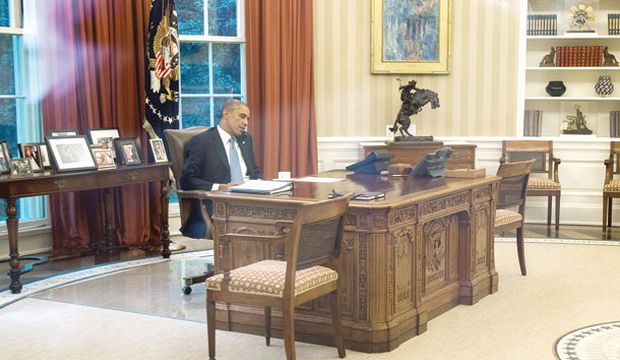
US President Barack Obama talks on the phone with King Abdullah Bin Abdulaziz of Saudi Arabia from the Oval Office of the White House in Washington, DC, United States, on September 10, 2014. (AFP Photo/ Jim Watson)
London, Jeddah, Riyadh and Beirut, Asharq Al-Awsat—A major summit of US and Arab officials will take place in the Saudi city of Jeddah on Thursday to discuss the formation of a coalition to confront terrorism in the region.
The meeting will be attended by the Gulf Cooperation Council (GCC) states, Jordan, Egypt, Turkey and Lebanon, as well as the United States, in the form of US Secretary of State John Kerry. An announcement was made late on Wednesday that Iraq would also be joining the meeting.
A US official told Asharq Al-Awsat: “The United States is looking forward to learning what the region’s states and allies can do to confront terrorism.”
The official, who spoke on condition of anonymity, said: “The issue is not about increasing the number of countries who will confront the Islamic State of Iraq and Syria (ISIS) and other extremist groups, but about clear actions and positions towards these groups.”
The official added: “There will be no discussion at this time about Iran’s participation in this alliance,” and that Washington did not see any role for Iran within the coalition.
Saudi Foreign Minister Prince Saud Al-Faisal and Secretary Kerry are expected to hold a joint news conference on Thursday to give details about the meeting, including the ways to curb the activities of extremist groups, including ISIS.
In the meantime, an Arab diplomatic source told Asharq Al-Awsat the meeting would form the last stage of the development of plans to confront terrorism in the region.
The meeting was also the subject of a telephone conversation earlier on Wednesday between the Custodian of the Two Holy Mosques, Saudi King Abdullah Bin Abdulaziz, and President Obama, which coincided with a meeting between Kerry and Iraqi Prime Minister Haider Al-Abadi in Baghdad.
The source added that following the opening of the meeting on Thursday, the foreign ministers will hold a closed session to put the final touches to a comprehensive counter-terrorism strategy.
Although the Americans are focusing on ISIS as the main threat to the region, they also believe in the danger posed by other armed groups which threaten the security of the Middle East and the world. The US official said: “The issue is going to be long and problematic, but the region and our partners in the Gulf can play an important role.”
The spokesman of the US Embassy in Riyadh, W. Johann Schmonsees, said Thursday’s meeting in Jeddah was the cornerstone of a road map for the fight against terrorism, adding that Kerry’s visit to Saudi Arabia aimed to establish an alliance of the main players in the region.
“Kerry will discuss bilateral cooperation with the region’s leaders, and the ways to employ the mechanisms of joint action to push forward the planned alliance to curb the actions of ISIS,” he said.
Schmonsees added: “There are more than 40 countries who share our ideas and views in joining efforts which can save Iraq from these terrorists, while considering the issue of helping Kurdish forces.”
He added that Saudi Arabia was a strong ally in the fight against terror.
France on Wednesday announced it may participate in air strikes in Iraq. Foreign Minister Laurent Fabius said France would take part “if it became necessary to take military air strikes.”
Meanwhile, official Turkish sources said Ankara was considering the possibility of participating in the alliance against ISIS. The sources, speaking on condition of anonymity, told Asharq Al-Awsat that the extent of this participation was still under discussion among Turkish leaders, and regional and international allies.
The sources added that there were “complications” which hindered Ankara’s possible participation in the alliance, a reference to the Turkish hostages held by ISIS in Mosul.
Additional reporting by Nasser Al-Haqbani in Jeddah, Fatah Al-Rahman Youssef in Riyadh, and Thair Abbas in Beirut.
